Live Forever & the Britpop explosion (“I’ve been on the shelf too long / now it’s time to hear my song”)
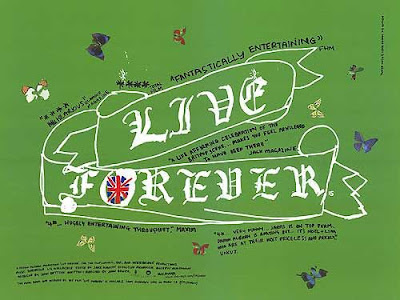 Britain in the mid-90s was a chaotic, creative, music-centric place to be. As Thatcher’s tenure as PM ended and a fresh start began under Tony Blair and the New Labour party, there was a simultaneous crackle and thrum of musical vibrancy that is explored in the 2003 documentary Live Forever (by filmmaker John Dower). On the surface it’s the story of the music, the “Britpop sound” and those who made it, but it also tries to get deeper underneath to look at the society at that moment and what fed this burgeoning supernova.
Britain in the mid-90s was a chaotic, creative, music-centric place to be. As Thatcher’s tenure as PM ended and a fresh start began under Tony Blair and the New Labour party, there was a simultaneous crackle and thrum of musical vibrancy that is explored in the 2003 documentary Live Forever (by filmmaker John Dower). On the surface it’s the story of the music, the “Britpop sound” and those who made it, but it also tries to get deeper underneath to look at the society at that moment and what fed this burgeoning supernova.
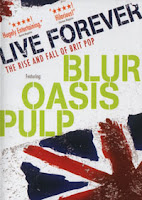 As a complete outsider to this specific moment in world history myself, but a fan of the music that ended up on my plate because of it, I thought it was fascinating to see one view of the context behind it. As Louise Wener from the band Sleeper says of those days, “There was a sense of a kind of excitement that something was changing — perhaps this music was foreshadowing something else.” The documentary undertakes the Herculean task of trying to examine the music through the social and political context of the mid-90s, teasing out its larger implications to the fabric of a generation. This is always tricky.
As a complete outsider to this specific moment in world history myself, but a fan of the music that ended up on my plate because of it, I thought it was fascinating to see one view of the context behind it. As Louise Wener from the band Sleeper says of those days, “There was a sense of a kind of excitement that something was changing — perhaps this music was foreshadowing something else.” The documentary undertakes the Herculean task of trying to examine the music through the social and political context of the mid-90s, teasing out its larger implications to the fabric of a generation. This is always tricky.
The story is mostly told through first person interviews from those who were there. You’ve got the big three represented in Oasis, Blur and Pulp, but also a number of other musicians and commentators. These conversations were illuminating and entertaining — not counting a few statements of general unfair snobbery related to my own culture, like “Americans have tremendous confidence, but not much talent,” and one remark that I obviously vehemently disagreed with regarding Seattle music of the time: “The only really decent group were Nirvana” (I said “Unh!” to myself and looked around at no one else sitting there with me, in indignation).
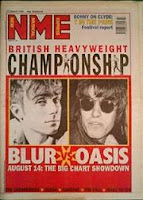 Along with snippets of music videos, concerts, newsclips and articles, the interviews carry the bulk of the story. Damon Albarn seems to have grown up quite a bit, his segments were pensive and thoughtful, accompanied by his strumming on a ukulele. Jarvis Cocker had some fantastic stories of those years and I enjoyed hearing his articulate reflection (but really, whatever he says, I just love his voice – deliciously smarmy and all rich velvet molasses). Liam was a complete wanker for most of his bits –so secure in his obvious awesomeness, relentlessly turning questions back around on the filmmakers, giving evasive answers, sitting there with that haircut and those mirrored shades sounding like he’s got a mouthful of marbles– but Noel was hilarious and awesome. Example: Towards the end, Noel’s talking about how they were in a studio one day next door to the prepubescent dance-pop of S Club 7, and how he seriously thought they were “special needs kids” there for a tour of the studios and for the free food. Touche.
Along with snippets of music videos, concerts, newsclips and articles, the interviews carry the bulk of the story. Damon Albarn seems to have grown up quite a bit, his segments were pensive and thoughtful, accompanied by his strumming on a ukulele. Jarvis Cocker had some fantastic stories of those years and I enjoyed hearing his articulate reflection (but really, whatever he says, I just love his voice – deliciously smarmy and all rich velvet molasses). Liam was a complete wanker for most of his bits –so secure in his obvious awesomeness, relentlessly turning questions back around on the filmmakers, giving evasive answers, sitting there with that haircut and those mirrored shades sounding like he’s got a mouthful of marbles– but Noel was hilarious and awesome. Example: Towards the end, Noel’s talking about how they were in a studio one day next door to the prepubescent dance-pop of S Club 7, and how he seriously thought they were “special needs kids” there for a tour of the studios and for the free food. Touche.
The film goes through the peak years of the Britpop sound, which were right smack in the middle of my high school years — a time when pretty much every single act coming out of Britain making pop/rock music was tagged part of “The Britpop Movement.” As surely as so-called “grunge bands” of ’90s Seattle shrugged away from the label, many of these Britpop bands weren’t thrilled with the simplistic categorization, but it did create a crackling excitement and level of buzz for their music that took them places they otherwise wouldn’t have gone just a decade prior.
So which Britain was it?
Is it the carefree abandonment of youth epitomized by Supergrass frolicking on the beach, singing lines like:
We are young, we run green, keep our teeth, nice and clean
see our friends, see the sights, feel alright
We wake up, we go out, smoke a fag, put it out
see our friends, see the sights, feel alright
But we are young, we get by, can’t go mad, ain’t got time
Sleep around, if we like, but we’re alright
The disaffected uncertainty (yet faith in music) of The Verve in “This Is Music”?
I stand accused, just like you
for being born without a silver spoon
Stood at the top of a hill
Over my town I was found
I’ve been on the shelf too long
Sitting at home on my bed too long
Got my things and now I’m gone
How’s the world gonna take me?
. . . Well music is my life and loved by me
I’m gonna move on the floor with my sweet young thing
Down down down, down we go
till I reach the bottom of my soul
This is music
Blur’s cocky questioning of having it all in “Parklife”?
The paranoia and ‘the sound of loneliness turned up to ten’ of Pulp’s “Fear”?
The indomitable conviction that you and I are gonna live forever?
Listening to the variety of sounds coming out of Britain at the time –all classified by someone or another as Britpop– shows you a bit of how meaningless the term really was. In the film, an interviewer asks Jarvis Cocker of Pulp as he sits on his bed by an open window, curtain fluttering in the breeze, about how his song Common People was called by one reviewer, “the perfect encapsulation of the Britpop aesthetic.” Jarvis just shakes his head, sighs a little, and says, “Oh no.”
Regardless of what it all means (and really, who knows what it all means), this is good music, and the film is 86 minutes well spent.
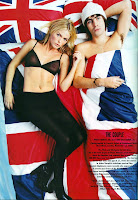 I had a lot of fun putting this mix together after watching the documentary, combining songs I remember liking the first time around with new discoveries and recommendations from friends on that side of the Pond. According to the film, the Britpop sound inhabited a relatively ephemeral period of time, starting ’round 1992, hitting boiling point in April ’94 with the release of Blur’s Parklife, followed in August by Oasis’ Definitely Maybe. In a similar scene that echoes the film Hype!, bands were getting signed at the height of the frenzy after having played together for mere weeks, with only a handful of songs written.
I had a lot of fun putting this mix together after watching the documentary, combining songs I remember liking the first time around with new discoveries and recommendations from friends on that side of the Pond. According to the film, the Britpop sound inhabited a relatively ephemeral period of time, starting ’round 1992, hitting boiling point in April ’94 with the release of Blur’s Parklife, followed in August by Oasis’ Definitely Maybe. In a similar scene that echoes the film Hype!, bands were getting signed at the height of the frenzy after having played together for mere weeks, with only a handful of songs written.
Some say that the death of the era came with a resounding thud in August ’97 with the release of the cocaine haze manifesto Be Here Now by Oasis. Other say it ended more around the time that footballer Gareth Southgate missed a penalty kick in the Euro ’96 semifinals against Germany. Come on. Is an era that exact? Go ahead and argue either way, influences started before then and the sound carried on after, but I’ve tried to mostly focus my own little mix in the thick of things, from ’94-’97.
And as with any label, you can debate it til the cows come home who fits into the category or not, so some of these may not gel in your mind as Britpop. I lack the immediate expert knowledge in this area, being more of a “grunge rock” girl myself when this was all going down (I shudder at that term, see?!). Snag the whole zip, enjoy the flow for some perfect weekend listening. In general, these make me feel a jaunty sense of optimism — and maybe slightly disaffected, but such were the Nineties, right?

THE FUEL/FRIENDS BRITPOP MIX:
Waterfall – The Stone Roses
Alright – Supergrass
God! Show Me Magic – Super Furry Animals
This Is Music – Verve
Parklife – Blur
Kelly’s Heroes – Black Grape
Common People (live at Melkweg 1995) – Pulp
Interview clip from Knebworth ’96 – Noel Gallagher
(discussing Kula Shaker & Liam’s Musical Tastes)
Hey Dude – Kula Shaker
Alright (live at Glastonbury) – Cast
Change – The Lightning Seeds
Faster – Manic Street Preachers
Wake Up Boo – The Boo Radleys
Lenny Valentino – The Auteurs
Line Up – Elastica
Step Into My World – Hurricane #1
Animal Nitrate – Suede
Hundred Mile City – Ocean Colour Scene
Getting Better – Shed Seven
She Makes My Nose Bleed – Mansun
Girl From Mars – Ash
Be My Light, Be My Guide (live) – Gene
The Fear – Pulp
The Only One I Know – The Charlatans
Live Forever (live at Glastonbury) – Oasis
ZIP FILE: FUEL/FRIENDS BRITPOP MIX
It’s worth noting that although some of these groups didn’t survive the end of the decade, many of them have gone on continue recording music that is just as good (and in may cases better) than their mid-Nineties output. Verve is reuniting and touring, Jarvis Cocker has a swanky euro-cool solo album out now, I rather liked Ocean Colour Scene’s last one, and Ash just rocked my world with their newest single. Media frenzy or no, the talent lasts.
It’s as James (the band from Manchester) said in the fantastic smack of their 1998 song “Destiny Calling”:
“So we may be gorgeous, so we may be famous —
come back when we’re getting old.”



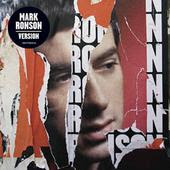
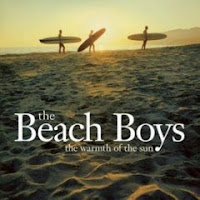
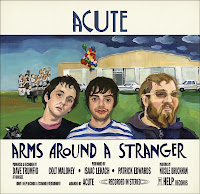

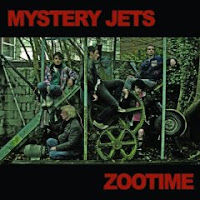

 Name: Heather Browne
Name: Heather Browne